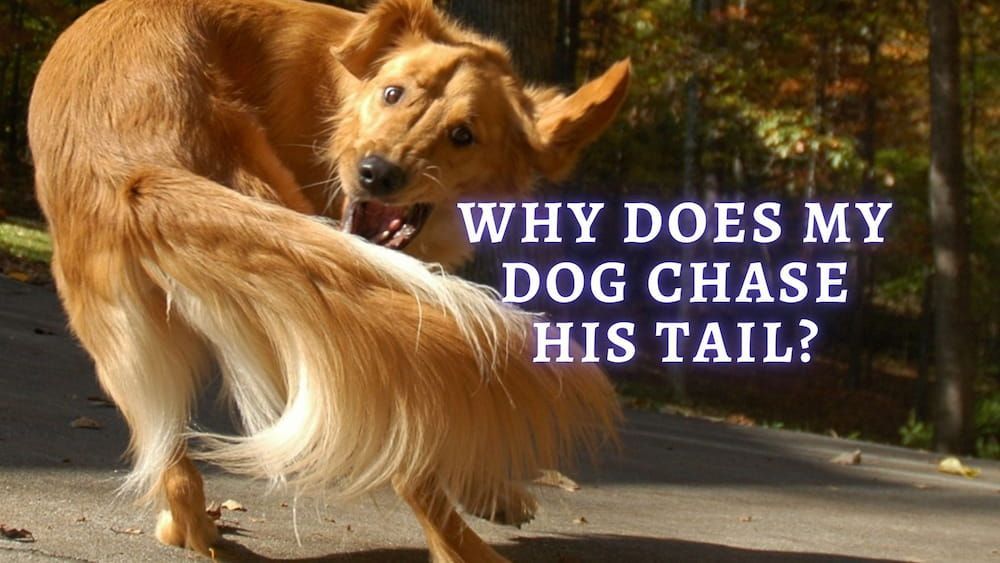
There are plenty of underlying causes that can lead a dog to chew on its tail so examining your dog when you notice this behavior is. Dogs who chase their tails often do so from anxiety overexcitement boredom or an underlying medical problem.

Obsessive Compulsive Disorder in dogs is not a direct concern but our pets can grow obsessed with particular patterns of behavior.
Why does my dog chase her tail after eating. If your dog is obsessively chasing his tail your vet can check to see if there is an infection a spinal abnormality or other medical issue causing the action. Sometimes dogs chew their tails because theyre bored or curious about their tail. Other times a dog chewing their tail can be a sign of something more serious.
Here are a few of the most common. If your dog chooses to pursue its tail over any other activity then forgoing the opportunity to eat play or chase a ball you may have a problem on your hands. Obsessive Compulsive Disorder in dogs is not a direct concern but our pets can grow obsessed with particular patterns of behavior.
This could explain why your dog is so determined. Fleas and ticks are common reasons that your dog might chase their tail and biting their back end. The pesty parasites can cause irritation to the base of your dogs tail causing them to seem like they are chasing their tail when really they are just trying to bite their back end.
If you notice your dog really going after her tail a lot and trying to nip at it and chew on it you may want to schedule a trip to the vet. Sometimes dogs will chase their tails because they are being bothered by worms or fleas or experiencing some other kind of medical issue. Compulsive tail-biting can also be caused by canine compulsive disorder CCD says Dr.
Just like obsessive compulsive disorder OCD can manifest in humans as obsessive cleaning or counting CCD in dogs can lead to compulsive tail-chasing fur-licking or fabric-sucking. Watching a dog chase and try to catch its tail can be totally adorable. But if you notice your dog is catching its tail and chewing on it regularly it might be a sign that something is wrong with your dog.
There are plenty of underlying causes that can lead a dog to chew on its tail so examining your dog when you notice this behavior is. My boss dog went to very expensive schools to get him trained to the max. He took off at work one day after a squirrel.
They got him back safely but it just proves what I always say noone believes me. She does chase her tail alot but does not eat the hair. It does sound alot like boredom as we had a border collie who used.
Extreme cases can cause unhealthy weight loss as your dog skips meals to spin as well as exhaustion from constant activity and painful sores from biting her tail when she catches it. Your vet can help you find the best way to work with your dog to alleviate the behavior which is likely to include antianxiety medications and behavioral therapy. Dogs who chase their tails often do so from anxiety overexcitement boredom or an underlying medical problem.
Some dogs such as German shepherds and bull terriers are more prone to tail-chasing behavior. If tail chasing is a regular part of your dogs day you can take steps to help your dog. This behavior might begin with your dog chasing his or her tail after a physical injury or due to itching.
Since it is a comforting exercise the behavior becomes a habitual response to any other threat that may occur after the dog has healed or the itching stopped. The dog therefore becomes conditioned to this response. Dogs can also chase their tails as a compulsive behavior.
In other words they can chase their tails due to an underlying mental illness that causes them to unnecessarily chew bite and chase their tail. Reasons For Dog Chasing Tail 1 Boredom Dogs most commonly chase their tails out of. Occasionally tail-chasing behavior is caused by a medical problem.
Discomfort in the tail lower back legs genitals or anus can cause enough irritation to make a dog spin around to try and chew or lick whatever hurts. In exceptionally rare cases neurological diseases such as epilepsy can cause tail-chasing behavior. If your dog is biting its tail it may be because it is suffering from environmental or food allergies.
Some of the most common environmental allergens include mold pollen or household chemicals. Dogs may also have a food allergy with some dogs being allergic to poultry wheat potatoes or even some types of vegetables.